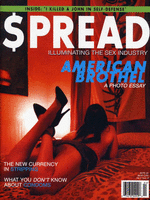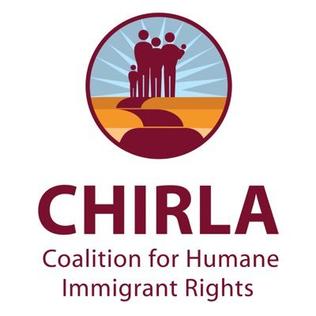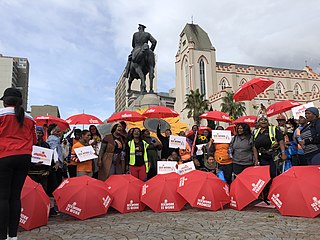Related Research Articles

A sex worker is a person who provides sex work, either on a regular or occasional basis. The term is used in reference to those who work in all areas of the sex industry. According to one view, sex work is voluntary "and is seen as the commercial exchange of sex for money or goods". Thus it differs from sexual exploitation, or the forcing of a person to commit sexual acts.

Sex work is "the exchange of sexual services, performances, or products for material compensation. It includes activities of direct physical contact between buyers and sellers as well as indirect sexual stimulation". Sex work only refers to voluntary sexual transactions; thus, the term does not refer to human trafficking and other coerced or nonconsensual sexual transactions such as child prostitution. The transaction must take place between consenting adults of the legal age and mental capacity to consent and must take place without any methods of coercion, other than payment. The term emphasizes the labor and economic implications of this type of work. Furthermore, some prefer the use of the term because it grants more agency to the sellers of these services.

$pread was a quarterly magazine by and for sex workers and those who support their rights. The magazine's focus was: "personal experiences and political insights" and it "contain(ed) practical information like news, features, health columns, and resources related to the sex industry".

The International Labor Rights Forum (ILRF) is a nonprofit advocacy organization headquartered in Washington, D.C., U.S., that describes itself as "an advocate for and with the working poor around the world." ILRF, formerly the "International Labor Rights Education & Research Fund", was founded in 1986, and the organization's mission statement reads: "ILRF believes that all workers have the right to a safe working environment where they are treated with dignity and respect, and where they can organize freely to defend and promote their rights and interests. ILRF works to develop practical and effective tools to assist workers in winning enforcement of protections for their basic rights, and hold labor rights violators accountable."
Worker centers are non-profit community-based mediating organizations in the United States that organize and provide support to communities of low-wage workers who are not already members of a collective bargaining organization, or have been legally excluded from coverage by U.S. labor laws. Many worker centers focus on immigrant and low-wage workers in sectors such as restaurant, construction, day labor and agriculture.
Bay Area Sex Worker Advocacy Network (BAYSWAN) is a non-profit organization in the San Francisco Bay Area which works to improve working conditions, increase benefits, and eliminate discrimination on behalf of individuals working within both legal and criminalized adult entertainment industries. The organization provides advice and information to social service, policy reformers, media outlets, politicians, including the San Francisco Task Force on Prostitution and Commission on the Status of Women (COSW), and law enforcement agencies dealing with sex workers.

Prostitution in Australia is governed by state and territory laws, which vary considerably, although none ban the selling of sex itself.

The Coalition for Humane Immigrant Rights, also known as CHIRLA, is a Los Angeles county-based organization focusing on immigrant rights. While the organization did evolve from a local level, it is now recognized at a national level. The Coalition for Humane Immigrant Rights of Los Angeles organizes and serves individuals, institutions and coalitions to build power, transform public opinion, and change policies to achieve full human, civil and labor rights. The Coalition for Humane Immigrant Rights of Los Angeles also has aided in passing new laws and policies to benefit the immigrant community regardless of documented status.

Sex workers' rights encompass a variety of aims being pursued globally by individuals and organizations that specifically involve the human, health, and labor rights of sex workers and their clients. The goals of these movements are diverse, but generally aim to legalize or decriminalize sex work, as well as to destigmatize it, regulate it and ensure fair treatment before legal and cultural forces on a local and international level for all persons in the sex industry.

Sex Workers Outreach Project-USA (SWOP-USA) is a national social justice network dedicated to the fundamental human rights of sex workers and their communities, focusing on ending violence and stigma through education and advocacy. SWOP might be considered a constructive program by nonviolent scholars and activists, as it attempts to create more imaginative and just communities, especially considering its focus on equality and education through advocacy. The organization was founded by Robyn Few on August 13, 2003, and their first major action was to organize the first annual International Day to End Violence Against Sex Workers with the Green River Memorial for the victims of Gary Ridgway, the "Green River Killer".

In the United States, human trafficking tends to occur around international travel hubs with large immigrant populations, notably in California, Texas, and Georgia. Those trafficked include young children, teenagers, men, and women; victims can be domestic citizens or foreign nationals.
Wendy Babcock was a Canadian activist for the rights of sex workers. Born in the city of Toronto, Babcock became a sex worker at the age of 15. From 2004 to 2007 she was a key member of Sex Professionals of Canada, an advocacy group whose main objective is to promote the rights of sex workers and the decriminalization of sex work in Canada.

Prostitution laws varies widely from country to country, and between jurisdictions within a country. At one extreme, prostitution or sex work is legal in some places and regarded as a profession, while at the other extreme, it is considered a severe crime punishable by death in some other places. A variety of different legal models exist around the world, including total bans, bans that only target the customer, and laws permitting prostitution but prohibiting organized groups, an example being brothels.

Stella, l’amie de Maimie is a Canadian non-governmental organization and community-based organization established and run "by and for" sex workers in Montreal, Canada. It offers information for woman-identified sex workers, such as street workers, escorts, strippers, intimate massage parlor workers, pornographic actresses, or erotic phone-call operators. The organization is designed to attend to the welfare of sex workers, and educate the public about sex work.

The decriminalization of sex work is the removal of criminal penalties for sex work. Sex work, the consensual provision of sexual services for money or goods, is criminalized in most countries. Decriminalization is distinct from legalization.
The Women's Legal Service NSW formerly the Women's Legal Resource Centre, is an independent, non-aligned, non-profit organisation funded by the Australian Commonwealth and state governments. It is part of the Community Legal Centre Network. WLS NSW promotes access to justice, particularly for women who are disadvantaged by their social or economic circumstances.
Meg Muñoz is an ally and advocate for sex workers. She is a former sex worker who founded Abeni, a nonprofit organization which seeks to support those who work in the sex/adult entertainment industry.

Transgender sex workers are transgender people who work in the sex industry or perform sexual services in exchange for money or other forms of payment. In general, sex workers appear to be at great risk for serious health problems related to their profession, such as physical and sexual assault, robbery, murder, physical and mental health problems, and drug and alcohol addiction. Though all sex workers are at risk for the problems listed, some studies suggest that sex workers who engage in street-based work have a higher risk for experiencing these issues. Transgender sex workers experience high degrees of discrimination both in and outside of the sex industry and face higher rates of contracting HIV and experiencing violence as a result of their work. In addition, a clear distinction needs to be made between consensual sex work and sex trafficking where there is a lack of control and personal autonomy.
Matilda "Red" Bickers is an American artist, writer, and sex worker rights activist. She has written for the now-defunct $pread, Tits and Sass, and the Red Umbrella Project.
Sex worker movements address issues of labor rights, gender-related violence, social stigma, migration, access to health care, criminalization, and police violence and have evolved to address local conditions and historical challenges. Although accounts of sex work dates back to antiquity, movements organized to defend sex workers' rights are understood as a more recent phenomenon. While contemporary sex worker rights movements are generally associated with the feminist movement of the 1970s and 1980s in Europe and North America, the first recorded sex worker organization, Las Horizontales began in 1888 in Havana, Cuba.
References
- ↑ "STROLL". squarespace. Retrieved 14 October 2017.
- ↑ "STROLL PDX". etsy. Retrieved 14 October 2017.
- ↑ "Portland Sex Workers Setting the Record Straight". the daily dot. 21 July 2015. Retrieved 14 October 2017.
- ↑ "Working It: The Activist Art Magazine Fueling Labor Rights for Strippers and Other Sex Workers". Huffington Post. October 2015. Retrieved 14 October 2017.
- ↑ "Northwest Workers Justice Project" . Retrieved 14 October 2017.